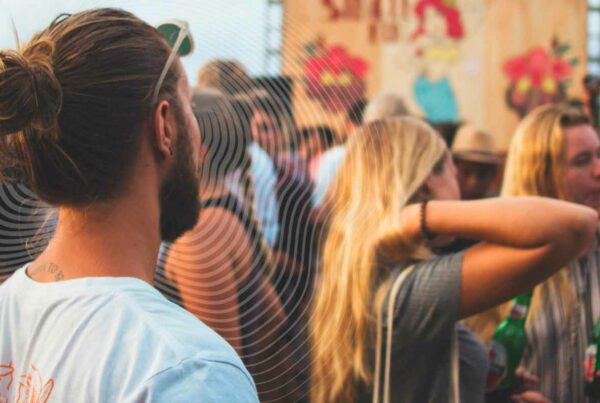Ibai Cereijo has been helping music and cultural businesses for years to improve their brand narrative to reach more customers on the Internet and in the media through his agency, Woo Media. He has directed the strategy in Spain for festivals such as Tomorrowland, Dreambeach, WAN, Puro Latino, Madrid Puro Reggaeton, Medusa Sunbeach or Havana World Music; of artists like Wade, B Jones, Rebeka Brown or Brian Cross; and brands like Brugal.
The stoppage of live music due to the pandemic has allowed him to explore a side that he is passionate about: training the youngest professionals and, in this context, he has just launched CAMPUS DJ PRO, a platform to help emerging DJs to progress in the industry . In its first edition it has brought together 3,000 artists from all over the Hispanic world and that has only just begun. That is why we have no doubt that we could not have better start of our #easygoing #Gofun edition, than with him and his vision of the present and future of technology and events.
How long have you been working in the music industry?
I have been working in communication since I made my debut at the age of 17 as an editor in ‘Galea’, a magazine from my town: Getxo (Bizkaia). In my mid-30s, I discovered Ibiza and fell in love with what was cooking there. In January 2013 I decided to take a radical turn in my professional career, getting into the music industry. It’s been already 8 years ever since.
In which sense do you think that technology can improve the customer experience?
The current human experience is already indivisible from technology. The classic categories such as online-offline or digital-analog are being diluted and we increasingly live in environments where reality and virtuality are more closely intertwined. Technology always has the same function: to enable, facilitate and speed up complex processes. Make the difficult things, easy. The whole long process from when a person listens to a song until, months later, they attend a concert is tremendously complex: creation, distribution, discovery, transmission, sale, logistics, security… The best technology is the one that cannot be seen and the one that has reduced that long way, to three or four clicks.
How do you think that festivals can take advantage of technology and processes digitisation?
For the consumer, the greatest opportunity that technology offers is to attend a festival without realizing the 10 or 15 processes they have gone through (ticket purchase, card verification, ticket issuance, voucher validation, wristband issuance access, wallet load…) because he simply hasn’t had to notice them and has been able to focus on the musical and social experience. For festival promoters, the greatest festival opportunity is the use of big data and business intelligence systems to gain in-depth knowledge of the behavior of their audience (sociodemographic profiles, preferences, routes, schedules, consumption…) and not have to gamble decisions of millions of euros at a stroke of instinct.
From the industry point of view, do you think Spain is committed enough with technology?
Our live music industry, has moved forward towards technology implementations this last decade, but it can not be said that Spain is avant garde or an early adopter. I also believe that there is a whole second division of less massive events, that keeps on working in a relatively artisan way, and it is in that league where you can mostly notice that resistance to a change.
Based on your experience, what do you think is the impact and benefit of technology to digitize payments and processes at the event?
The impact is huge. The promoter of a massive festival, like some of the ones I’ve been working in (Tomorrowland, Dreambeach, Medusa, WAN…)., needs to speed up, simplify and automate processes. An, above all, needs to solve problems and not to add new ones. The technology applied in a clever way, combined with a capable human group, satisfies all these requirements.
How important is communication to you when technology is implemented in a festival?
A big music festival is a great faces, sounds and trends catwalk. Communication is essential to make the attendees, participants in the innovation trip the festival is inviting them at.
Which role do you think technology plays in order to achieve industry recovery?
It is going to be essential. Technology is one of the most reliable institutions for the current society, and that is the most urgent thing we have: to recover the confidence.
How do you think the festival users perceive and value the use of technology?
Young and not that young public, attend to the festival with a technology in their pockets more powerful than the one that put the man on the moon back in 1969: their mobile phones! And they intensively use it to connect, search information and document every step they take. Parting from there, those who work in festivals we know that every technology we offer, succeeds: promotions with QR codes, social media campaigns, proximity marketing, geolocation discounts, virtual or augmented reality actions…A festival is a trends laboratory, and this is something that festival’s people love.
What weight do you think COVID-19 has had on the digital transformation of the sector? And in your specific case, do you plan to implement any new technology?
Covid-19 is going to change everything in the next decade, and we cannot even know how much. There are lots of internal processes of a festival promoter that have had to face an accelerated digital transformation, and that is probably the only one benefit that pandemic has had. It is still uncertain how far coronavirus will affect the business model of big festivals, and how they will have to be transformed to adjust to the new normal of a scared and in permanent alert society.
Your prognose about the next future keeping in mind the current situation and, how do you see the festival of the future?
After a year massively instilling fear in the population, it will take time to recover health confidence. But when it does, arts, culture and entertainment will enjoy a new 20’s: a spectacular flowering of entertainment consumption. After months or years of confinement and agony, people are going to go out in a rush to spend, party and dance. There are many things about this pandemic that have come to stay: temperature checks, disinfectant spray arches, stricter capacity controls, rapid tests at entrances… All this is a bit dystopian, but I don’t think there is no other option. Perhaps even verification of vaccination as an entry requirement will become common. Although it is unconstitutional, they will find a way to establish it.


